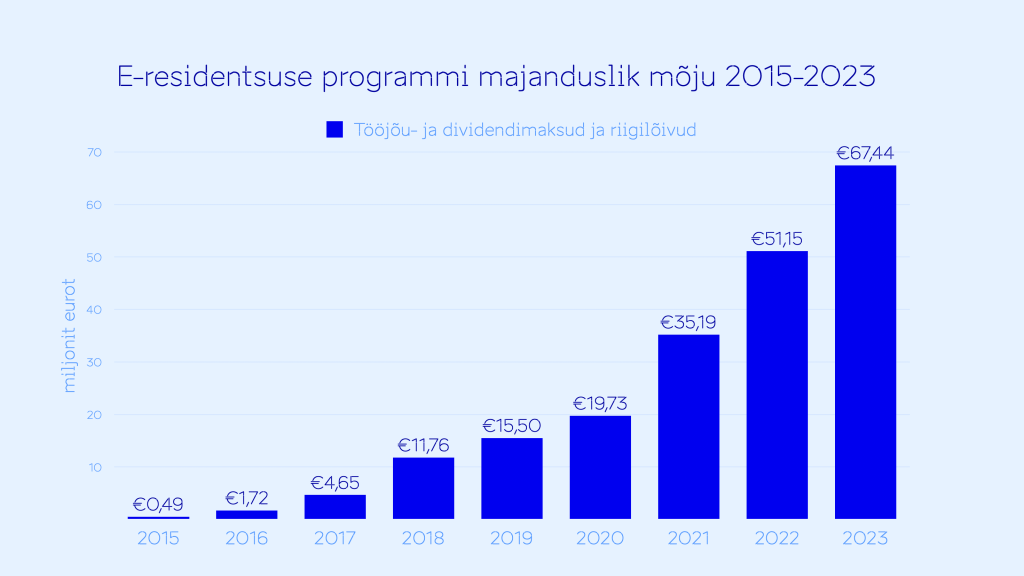E-residents contributed €67.4 million to Estonian state budget in 2023
In 2023, tax revenues from the Estonian companies of e-residents amounted to a record €64.3 million, a 33 percent increase on the previous year. Including state fees, the program's total annual contribution to the Estonian state budget was €67.4 million.
According to Estonian Minister of Economic Affairs and Information Technology Tiit Riisalo, e-Residency has proven itself to be a profitable way for Estonian to earn additional tax revenue.
"Estonia's wealth growth is driven by strong exports and an entrepreneurial mindset. All countries are competing to attract foreign capital and talent, and e-Residency continues to be Estonia's unique trump card in the world. e-Residency is an opportunity for foreign entrepreneurs to use the constantly developing services of Estonia's digital state, and the program gives a reason to contribute to the Estonian economy from the outside, so that their companies can grow, develop, create jobs and pay taxes here," said Riisalo.
According to Liina Vahtras, CEO of e-Residency, the main selling point of the program is the ability for e-residents to establish an Estonian company, with the program focusing on ways to make starting a business faster and more convenient than before.

"The biggest obstacle here is the lack of a fully digital alternative to the e-resident's physical digital ID card, which means an average two-month waiting time for the e-resident before establishing a company. This year, the goal is to develop a completely card-free solution that would enable e-residents to identify themselves safely at the Estonian embassy and activate their digital ID immediately with a mobile app, and without waiting for the card," said Vahtras.
Vahtras added that, in cooperation with the Police and Border Guard Board (PPA) and the Ministry of Communication and IT, e-residents can expect a remote identification solution to be available within a few years, allowing them to extend the validity of their digital ID in the future without the need to visit an embassy in person.
In the first six months of 2023, 32 percent of new e-residents founded a company in Estonia, which was 3 percent more than a year earlier. Last year, an additional 4,592 Estonian companies were launched by e-residents. e-residents with the citizenship of Spain (678), Ukraine (397) and Germany (345) founded the most new Estonian companies last year. Citizens of those countries also top the list of people joining the program. In 2023, 12,106 e-resident applications were received, which was 2.3 percent more than the year before.
Labor taxes accounted for the majority of tax receipts last year – 63 percent, or €40.7 million. The remaining 37 percent was collected from income tax in special cases (mainly from dividends), which was received from Estonian companies belonging to e-residents, and totaled €23.6 million.
Estonian companies belonging to e-residents operating in the information and communication sector paid the most (€20.6 million euros). This was followed by companies in the professional, scientific and technical activities sector (€16.2 million) and companies in the administrative and auxiliary activities sector (€7.2 million).
Estonia launched the world's first e-Residency program at the end of 2014, with the aim of providing non-residents safe access to its fully digital public services. Over the years, over 110,700 people have been granted e-resident status with close to 60,000 e-resident digital ID cards currently in use. E-residents have set up more than 29,400 companies in Estonia, establishing 20 percent of all new Estonian companies annually.
Since its launch, e-Residency has generated more than €213 million in direct revenue for the Estonian state budget through tax revenue and state fees. The program also generates indirect revenue through the growth of Estonian companies listed on the e-Residency Marketplace, offering business, financial, insurance and other consulting services to e-resident founders.
More information about e-residency in Estonia is available here.







